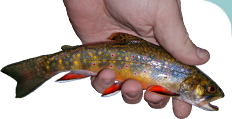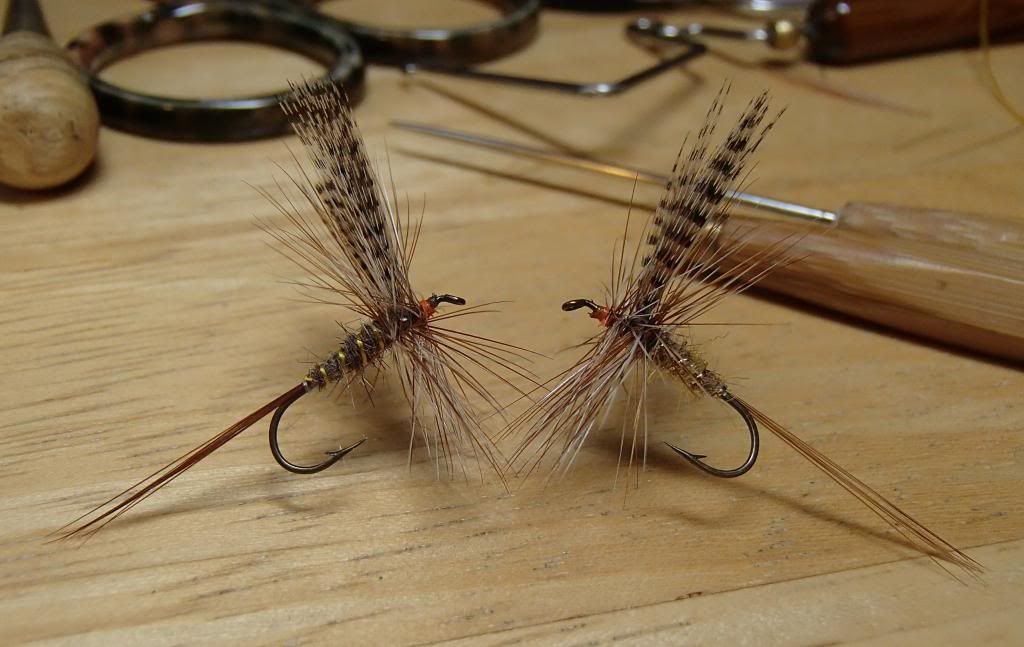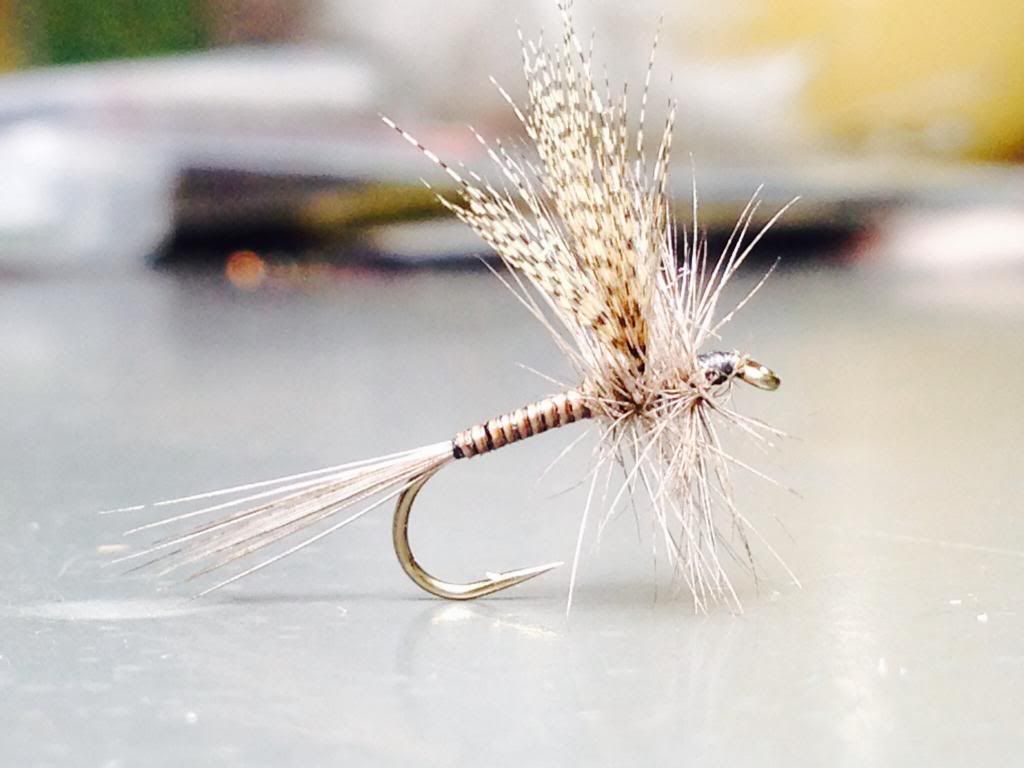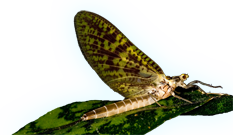Blog & Latest Updates
Fly Fishing Articles
Insects by Common Name


> > March Browns
| Catskilljon | March 27th, 2014, 9:04 pm | |
| Upstate NY Posts: 160 | According to John Atherton. Atherton, always the impressionistic tyer devised these two March Brown imitations utilizing seals fur and ribbing to get the point across. < />  Like Flick he preferred heavily barred wood duck for the wings and mixed hackle. CJ | |
| Gus | March 28th, 2014, 1:57 pm | |
| colorado Posts: 59 | Beautiful work! | |
| "How do you help that son of a bitch?" "By taking him fishing" -A River Runs Through It www.jsrods.com | ||
| Oldredbarn | March 28th, 2014, 9:11 pm | |
| Novi, MI Posts: 2608 | Beautiful work! I'll second Gus' comments! Wonderful. John, tell us a little bit about porportions on these classics. It may have been a while, if ever, that some of the younger members here have tied a classic Catskill tie. I have Eric Leiser's bio of the Dettes and it is a very interesting read. I fear that we may have lost those good old fly shops that we used to visit where the air hung with river lore and tall tales, smelling of laquers and the owners own mixture fly flotant. Where you felt special and like you were part of the club when you showed up and the owner knew your name. We still have a couple of the old shops up in Grayling, but the youngsters own and run them now...They are stretched between two worlds...One for the new generation of foot long articulated streames and plastic and foam, and one of whats left of the "old school" still dreaming of the perfect dun neck that has some feathers down somewhere near the size 20 hook range. These are interesting times. It is good to see these old flies and to hear that some of the younger generation, say JohnW and Eric, are still trying their hand at tying them and fishing them. Spence | |
| "Even when my best efforts fail it's a satisfying challenge, and that, after all, is the essence of fly fishing." -Chauncy Lively "Envy not the man who lives beside the river, but the man the river flows through." Joseph T Heywood | ||
| Catskilljon | March 28th, 2014, 11:57 pm | |
| Upstate NY Posts: 160 | John, tell us a little bit about porportions on these classics. It may have been a while, if ever, that some of the younger members here have tied a classic Catskill tie. I think Harry Darbee described it best... "Its characteristics a good sized hook, typically size 12 model perfect; a notably lean, spare body, usually of spun fur or stripped quill of peacock herl; a divided wing of lemon wood duck flank feather; and a few sparse turns of incredibly stiff, clean, glassy cock's hackle, mostly either blue dun or ginger. The wings and hackle are set back from the eye of the hook, leaving an unusually clean "neck" at the expense of a shortened body. This puts the sustaining hackle so close to the point of balance that the fly rides over broken, turbulent water like a Coast Guards lifeboat, so nearly balanced that often the tail of hackle wisk doesn't touch the water at all" I notice that many of the "Catskill" flies I see in shops bins are heavily overdressed, partly because much of the tradition is lost through time and somewhat because when buying flies, buyers want heavy dressings. In really fast headwater streams, a bushy fly works very well for flotation [though I find that heavy dressings inhibit hook sets on the smallish trout we target in those waters!] I usually use 10 turns of hackle which sounds like a lot, but its 5 turns for 2 feathers, and the hackle I use is more "old school" and not the densely fibered genetic hackle of today. Back when Harry was tying, you only had about an inch of good feather right at the tip, the rest was web. They sometimes used 3 or 4 feathers on a heavily dressed fly like the Coffin Fly or the Dun Variant. Harrys description is good, almost perfect actually but glaringly obvious is the fact that he left out quill wings and floss bodies, and a host of other materials. I think it's a pretty accurate view of the Catskill style, Anyway Spence, I know you asked for a "little bit" sorry to be so long winded! CJ | |
| Entoman | March 29th, 2014, 1:25 pm | |
| Northern CA & ID Posts: 2604 | Thanks, CJ. You are spot on. Most of my standard ties are in the Catskill mold. I've found that on riffly water they usually outperform "modern imitations." If there's a breeze on a lake during a Speckled Spinner hatch or fall, give me a sparse Adams or Dk. Hendrickson over the parachute or no-hackle patterns every time. The heavily dressed commercial versions are the reason many consider standard collared flies inferior for hatch matching. Mayflies are delicate little creatures and the modern "bottle brushes" a lot of guys throw are better matches for weed seeds.:) PS. A caution for the guys that haven't tried this style of tying but are about to. Cull your hooks! Open or rough edged eyes will give you grief if you don't. ;) Also be picky about your wing sets. The longer proportions will make the flies float on their sides if they are tilted off center or denser on one side. | |
| "It's not that I find fishing so important, it's just that I find all other endeavors of Man equally unimportant... And not nearly as much fun!" Robert Traver, Anatomy of a Fisherman | ||
| Jmd123 | March 29th, 2014, 1:32 pm | |
| Oscoda, MI Posts: 2611 | I agree with Kurt. Most if not all of my mayfly dries are of the classic Catskill construction. I don't have any trouble getting the trout to take 'em, although as I have alluded to on here before my waters are not heavily fly fished so it doesn't take the latest pattern to fool most of them. In addition, I like the Wulff patterns too, having had a lot of luck with them over the years, especially on picky fish or when out after dark. They are of course more heavily dressed, but come in handy when one needs a more prominent silhouette or better flotation. Just my 2 cents as usual... Jonathon | |
| No matter how big the one you just caught is, there's always a bigger one out there somewhere... | ||
| Oldredbarn | March 29th, 2014, 4:30 pm | |
| Novi, MI Posts: 2608 | Anyway Spence, I know you asked for a "little bit" sorry to be so long winded! CJ What do you mean, man?! This is the kind of discussion we hunger for sir. One of the nicer bits of our sport has always been the sharing of knowledge, the passing it down, and of course pretending that some of the spots we visit, or the flies we tie, are secret. ;) Really. Thanks for sharing. Those are beautiful creations and a very big part of the history of American fly fishing. Spence | |
| "Even when my best efforts fail it's a satisfying challenge, and that, after all, is the essence of fly fishing." -Chauncy Lively "Envy not the man who lives beside the river, but the man the river flows through." Joseph T Heywood | ||
| Entoman | March 29th, 2014, 9:12 pm | |
| Northern CA & ID Posts: 2604 | Absolutely! | |
| "It's not that I find fishing so important, it's just that I find all other endeavors of Man equally unimportant... And not nearly as much fun!" Robert Traver, Anatomy of a Fisherman | ||
| Crepuscular | March 29th, 2014, 11:10 pm | |
| Boiling Springs, PA Posts: 923 |
Yeah I still tie them and fish them, probably not enough though. I too like them in heavier water.  | |
| Entoman | March 30th, 2014, 5:00 pm | |
| Northern CA & ID Posts: 2604 | Nice, Eric. Those are the proportions I use, albeit a few less turns of hackle. They are more in line with what I thought were Rube Cross's, who basically codified the Catskill style. Hooks with shanks 2x gap width - tails & wings = shank L. - hackle 1.5x gap width. CJ - The roots of the Catskill style are fascinating. It is my understanding that Gordon and his protege Steenrod tied their rolled wings unsplit and angled back. It was Cross that added the split vertical wing, turle knot space at the eye and the conventional proportion ratios (as above) most commonly used today. It is also my understanding that the Dettes and Darbees closely matched his style as did Art Flick and his mentor Preston Jennings (though the latter two omitted the Turle gap). Where does Atherton fit into this? Ray Bergman used larger ratios too. Is there a connection there? | |
| "It's not that I find fishing so important, it's just that I find all other endeavors of Man equally unimportant... And not nearly as much fun!" Robert Traver, Anatomy of a Fisherman | ||
| Oldredbarn | March 30th, 2014, 5:29 pm | |
| Novi, MI Posts: 2608 | I have a copy of Reuben Cross', "The Complete Fly Tier". It's jammed with info. There is a picture in there showing him winding dubbing on silk and rolling it on his pant leg. Materials, hooks, tying techniques, tools, etc. There is a picture of Darbee holding up a twenty pound salmon. Another picture has Reuben with a live rooster under his arm while inspecting one of the birds feather. Good stuff. Spence | |
| "Even when my best efforts fail it's a satisfying challenge, and that, after all, is the essence of fly fishing." -Chauncy Lively "Envy not the man who lives beside the river, but the man the river flows through." Joseph T Heywood | ||
| Wbranch | March 30th, 2014, 6:43 pm | |
| York & Starlight PA Posts: 2733 | Here is a book some of you might like; http://www.amazon.com/Founding-Flies-The-American-Influences/dp/0811708330 I actually found on the Internet the entire document. At the time I was unaware it was a recently published book. I'm so glad I found that out because I had planned to post the link to the document I found which would probably of gotten me in a pickle if the author found out about it. | |
| Catskill fly fisher for fifty-five years. | ||
| JOHNW | March 31st, 2014, 8:30 pm | |
| Chambersburg, PA Posts: 452 | While I don't have any photos readily at hand to share I always enjoy tying this style of fly and aspire to tie the perfectly proportioned catskill. My reasons for tying and fishing them initially was they were not the fashionable thing so in my twisted brain they were the change up from what everyone else was throwing. However it grew into an artistic thing. Now the well tied catskill is almost the highest form art (surpassed only by Full Dress Atlantic Salmon flies). JW | |
| "old habits are hard to kill once you have gray in your beard" -Old Red Barn | ||
| Wiflyfisher | April 1st, 2014, 11:28 pm | |
| Wisconsin Posts: 663 | I love the Classic dries and I enjoy tying them. I also enjoy tying and fishing this...I like the Wulff patterns too, having had a lot of luck with them over the years, especially on picky fish or when out after dark.  | |
| John S. https://WiFlyFisher.com | ||
| Wbranch | April 2nd, 2014, 1:19 am | |
| York & Starlight PA Posts: 2733 | Lovely example of a classic Wullf pattern and the Catskill style. What is the tail? Peccary? Wood chuck? | |
| Catskill fly fisher for fifty-five years. | ||
| Crepuscular | April 2nd, 2014, 9:38 am | |
| Boiling Springs, PA Posts: 923 | Nice thread. Makes me wanna fish these flies! Spring is trying to get here. Nice, Eric. Those are the proportions I use, albeit a few less turns of hackle. Thanks Kurt, That's those are the proportions I learned to tie. And yes this examle is a little heavy on the hackle. It's for a specific piece of water where a little extra helps. ;) | |
| Wiflyfisher | April 2nd, 2014, 6:50 pm | |
| Wisconsin Posts: 663 | Lovely example of a classic Wullf pattern and the Catskill style. What is the tail? Peccary? Wood chuck? Matt, woodchuck guard hairs. CJ, ties an awesome Catskill dry fly!! | |
| John S. https://WiFlyFisher.com | ||
| Jmd123 | April 2nd, 2014, 8:29 pm | |
| Oscoda, MI Posts: 2611 | That's a beautiful Wulff there, John! Yeah, I love 'em too, fish always seem to hit them pretty hard, it's not a subtle thing. My two faves are the White Wulff and the Royal Wulff, they've been key flies for me in many situations. Jonathon | |
| No matter how big the one you just caught is, there's always a bigger one out there somewhere... | ||
| Sandfly | January 19th, 2015, 11:46 am | |
| tioga co. pa. Posts: 33 | I still have an old time shop, just like the dettes and darbys had. in my house, stories and advise free of course. | |
| sandfly shop owner N.J.B.B.A. #2215 Tiadaughton T.U. 688 I didn't Escape------They gave me a day pass ! | ||
| Gutcutter | January 19th, 2015, 7:12 pm | |
| Pennsylvania Posts: 470 | Beautiful flies, CJ, Eric and John. I have always held the opinion that the only time bronze mallard or wood duck represent an accurate wing color is for imitating March Brown and Grey Fox. Some other traditional patterns (Quill Gordon, Light and Dark Hendrickson to name a few) also use this material for the wing. Does anybody on this forum still tie on classic Catskill dry flies to actively feeding, large trout in slow pools on heavily fished waters? Is it your first choice? If so, why? If not, why? | |
| All men who fish may in turn be divided into two parts: those who fish for trout and those who don't. Trout fishermen are a race apart: they are a dedicated crew- indolent, improvident, and quietly mad. -Robert Traver, Trout Madness | ||
Quick Reply
You have to be logged in to post on the forum. It's this easy:
Related Discussions
| Title | Replies | Last Reply |
| Valla’s New Book The Classic Dry Fly Box In General Discussion by Flymom | 0 | |
| Re: Whiting 4 B's Coachman Brown Hen Capes In Fly Tying by Wiflyfisher | 1 | Dec 20, 2016 by Wbranch |
| Re: Tying Catskill-Style Dry Flies In Fly Tying by Wiflyfisher | 5 | Mar 14, 2010 by Shawnny3 |
| Re: Tail types In Fly Tying by Wbranch | 7 | Sep 7, 2008 by Leakywaders |
| want to trade? In General Discussion by Jamesti | 0 | |
| Re: Season Start In Male Strophopteryx fasciata Stonefly Adult by Flybyknight | 5 | Dec 24, 2007 by Martinlf |
| Re: Need help.. In Fly Tying by Nightangler | 1 | Sep 16, 2006 by GONZO |
| Re: Modern Darbee Genetics In Fly Tying by Pabrookbum | 2 | Nov 27, 2021 by Wbranch |
| Mosquito Adams In Fly Tying by Mcflyangler | 0 | |
| Re: Dear Catskill Style tiers..... In Fly Tying by Byhaugh | 22 | May 7, 2014 by Entoman |
Troutnut.com is copyright © 2004-2024 Jason
Neuswanger (email Jason). See my FAQ for information about use of my images.
 privacy policy
privacy policy








